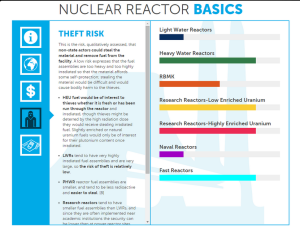September 23, 2015
The James Martin Center for Nonproliferation Studies (CNS), in partnership with the Nuclear Threat Initiative (NTI), has released a new Nuclear 101 online tutorial that answers basic questions about nuclear materials, reactors, and weapons. The mobile-friendly resource uses interactive tools to help students, professionals, and the news media understand why nuclear materials are unique and how they can be used to generate power—and peril.
 As its name suggests, the Nuclear 101 tutorial is an introduction to the science behind nuclear materials and nuclear weapons. A series of videos and graphics help demystify complex physical and chemical processes such as how a plutonium is produced in a reactor and how enrichment and reprocessing work. A new slider tool uses everyday objects to show just how much uranium would be needed to build a bomb at different enrichment levels, a hot topic surrounding negotiations over Iran’s nuclear program.
As its name suggests, the Nuclear 101 tutorial is an introduction to the science behind nuclear materials and nuclear weapons. A series of videos and graphics help demystify complex physical and chemical processes such as how a plutonium is produced in a reactor and how enrichment and reprocessing work. A new slider tool uses everyday objects to show just how much uranium would be needed to build a bomb at different enrichment levels, a hot topic surrounding negotiations over Iran’s nuclear program.
The tutorial explains the differences between reactors types, including those used for nuclear power, for research and for naval programs. An “attribute explainer” condenses the information to show why countries choose certain types of reactors, comparing them across key categories such as cost, theft risk and proliferation risk.
In the module on nuclear weapons, a powerful graphic compares US nuclear firepower in 1945 and nearly 70 years later. The graphic shows that the 2012 US nuclear arsenal was 41,000 times more powerful than in 1945-the year the United States dropped its entire arsenal of two bombs on Hiroshima and Nagasaki. A shareable graphic shows what’s changed since 1945: nine countries now have nuclear weapons.
The Nuclear 101 tutorial adds to NTI’s growing library of online tutorials produced in partnership with CNS that cover a wide range of nonproliferation topics, including the Nuclear Non-Proliferation Regime, the Treaty on the Non-Proliferation of Nuclear Weapons (NPT), Nuclear and Radiological Security, and WMD Delivery Systems. Educators can integrate the tutorials into lesson plans by asking students to present a certificate of completion after testing their knowledge with a quiz, included at the end of each tutorial.
Upcoming tutorials will cover biological and chemical weapons, the nuclear budget, and nuclear testing.
CNS strives to combat the spread of weapons of mass destruction by training the next generation of nonproliferation specialists and disseminating timely information and analysis. CNS at the Middlebury Institute of International Studies is the largest nongovernmental organization in the United States devoted exclusively to research and training on nonproliferation issues.
